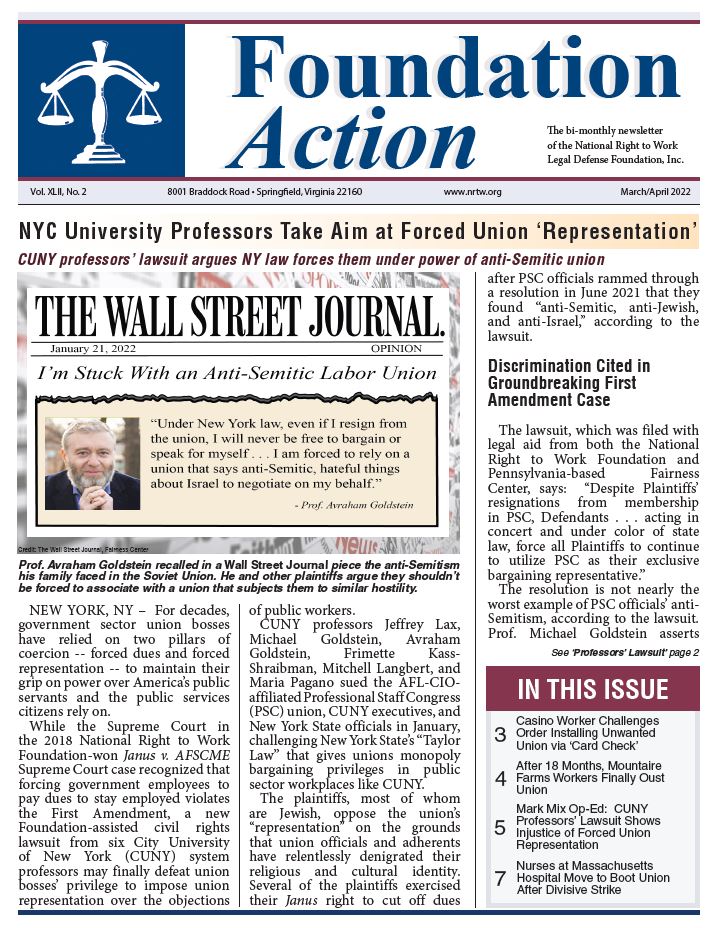Ascension Providence Rochester Hospital Lab Techs Secure Victory in Effort to Remove Unwanted Union
After failing to block the vote using cynical legal arguments, OPEIU union officials ran away rather than face loss in decertification election
Rochester, MI (June 13, 2022) – Lab technicians at Ascension Providence Rochester Hospital in Michigan, have finally won their effort to be free of unwanted so-called” representation” by union officials of the Office and Professional Employees International Union (OPEIU) Local 40. After workers secured a decertification vote over union officials’ objections, the union disclaimed interest in representing the bargaining unit rather than face a vote of the workers they had claimed to “represent.”
Ascension workers Alyse Gschwender and Delaney Warren received free legal representation from National Right to Work Legal Defense Foundation staff attorneys during the decertification process before the National Labor Relations Board (NLRB).
The petition for the vote to remove OPEIU officials, which signed by numerous Ascension lab technicians, was filed April 6, 2022, by Ms. Warren. After she took a position outside of the bargaining unit, Ms. Gschwender became the petitioner.
During the protracted process, Foundation staff attorneys successfully fought off OPEIU union lawyers’ efforts to block the vote cited the pending sale of the facility by Ascension to LabCorp as grounds for rejecting the workers’ request for an election. Union lawyers had urged the NLRB to block a vote whether to remove the union on the grounds of an upcoming “cessation of operations” by the employer, a policy previously applied only to certification elections.
In briefs to the NLRB Foundation staff attorneys countered that such grounds for blocking the vote were unjustified both as a matter of law and considering the facts of Ascension Providence Rochester Hospital’s announcement regarding the potential transfer of the operation to LabCorp. Foundation attorneys also noted that the attempt to block the vote was likely a cynical attempt to keep power over the bargaining unit, because if the sale ultimately went through the union would have likely sought to block a decertification vote citing the NLRB-created “successor bar” that insulates union officials from decertification votes after an employer’s change in ownership.
The Board rejected the union lawyers’ arguments and scheduled a decertification vote by mail-in ballot with the votes set to be counted later this month. However, rather than go forward with a vote they apparently knew they were going to lose, OPEIU officials instead disclaimed interest in the unit, finally giving the workers the freedom from unwanted union representation they sought.
Because Michigan is one of 27 states with Right to Work protections for private sector employees, unions cannot force workers to pay union dues or fees as a condition of keeping their jobs. However, even in Right to Work states union officials are empowered to impose monopoly representation on entire units of workers even over the objections of many workers within the unit, necessitating decertification elections to remove unwanted union “representation.”
“No worker anywhere should be forced under a union’s so-called ‘representation’ against their will. Foundation staff attorneys stand ready to provide legal aid to workers wanting to hold a decertification election to oust a union they oppose and believe they would be better off without,” commented National Right to Work Foundation President Mark Mix. “This case shows the lengths union lawyers will go to block workers from even holding votes to remove a union, even when union officials know that the vote will likely demonstrate that most workers want nothing to do with the union.”
Teamsters Officials Hit With Federal Charges for Having USF Holland Worker Illegally Fired
NLRB charges filed against union and employer after company fired worker for exercising his right not join the union
Jackson, MN (June 8, 2022) – Jannie Potgieter, who up until recently was a freight employee at industrial park USF Holland in Jackson, Minnesota, has filed federal charges against the International Brotherhood of Teamsters Local 120 union and his employer. Mr. Potgieter’s charges say that Teamsters bosses became hostile because he exercised his right not to be a union member, and that USF Holland officials illegally terminated him at Teamster officials’ behest. Mr. Potgieter is receiving free legal representation from National Right to Work Legal Defense Foundation staff attorneys.
Mr. Potgieter’s charges were filed on May 27, 2022, with the National Labor Relations Board (NLRB), the federal agency that enforces the National Labor Relations Act and adjudicates disputes among private sector employers, unions, and individual employees. The charges state that on May 18, 2022, a USF Holland manager discharged him because he exercised his rights under Communications Workers of America v. Beck (1988).
Because Minnesota lacks Right to Work protections for private sector employees, unions can force them to pay union fees as a condition of keeping their jobs. However, under Communications Workers v. Beck, a U.S. Supreme Court decision won by Foundation staff attorneys, formal union membership cannot be required, nor can payment of the part of dues used for non-bargaining expenditures like union political activities. In contrast, in the 27 states with Right to Work protections, union membership and financial support are strictly voluntary.
Recently, Foundation attorneys aided Remmington Duk after his employer, Robert Basil Buick GMC, and International Association of Machinists (IAM) illegally terminated Mr. Duk for exercising his Beck rights. In that case both the employer and union quickly backed down, ultimately paying Duk more than $18,000 in settlements, in addition to being required to post notices informing other workers of their Beck rights.
“Foundation attorneys will continue to defend workers who are illegally threatened by union officials for exercising their rights, including not to become a formal union member and not to fund union political activities,” commented National Right to Work Foundation President Mark Mix. “Employers that illegally fire workers at the behest of union officials will similarly be held accountable by Foundation attorneys.”
“Ultimately, this case shows why Minnesota workers need the protection of a Right to Work law to ensure all union payments strictly voluntary,” Mix added. “While Mr. Potgieter knew his rights enough not to simply give into Teamsters’ bosses illegal demands, there are almost certainly countless other workers who pay out of fear, not only for their livelihoods but also as a result of the Teamsters and other union bosses’ well-earned reputation for deploying thuggish tactics.”
Worker Advocate Demands Department of Labor and Department of Justice Investigate Michigan SEIU Local’s “Serious Financial Malpractice”
Michigan hospital workers seek to oust Healthcare Michigan union SEIU International recently put into trusteeship
Detroit, MI (June 6, 2022) – Today, National Right to Work Legal Defense Foundation President Mark Mix formally asked the Department of Labor, the Department of Justice, the U.S. Attorney of Michigan, and the Office of Labor-Management Standards to investigate serious allegations of financial wrongdoing by the Service Employees International Union (SEIU) affiliate Healthcare Michigan (HCMI). Foundation staff attorneys are providing free legal aid to workers at Sinai-Grace Hospital who are seeking a National Labor Relations Board (NLRB) decertification vote whether to remove HCMI officials from their workplace.
About the time the workers filed their second decertification petition to end the union’s so-called “representation” of the bargaining unit, the SEIU International announced it was putting the local into trusteeship due to serious and longstanding wrongdoing by local union officials. In her letter announcing the decision to take over the local, SEIU International President Mary Kay Henry concluded that there are “substantiated allegations of serious financial malpractice” and other issues of impropriety at HCMI.
Citing the SEIU’s trusteeship announcement, the National Right to Work Foundation President demanded that officials at the Department of Justice and Department of Labor also investigate HCMI union officials for illegally abusing their power, committing financial misdeeds, and possibly filing false reports with the Labor Department: “Any internal SEIU International investigation will be insufficient. There is a long history of union officials attempting to ignore or downplay corruption in their own ranks.”
The Sinai-Grace Hospital workers’ first petition seeking a vote to oust HCMI union officials was blocked after the NLRB sided with union lawyers in interpreting ambiguous union contract language to find that petition untimely. The sloppy contract language was negotiated by the union officials whom the SEIU International has now removed from power for, among other things, apparent malfeasance in properly accounting for how they spent workers’ dues money.
Undeterred by that NLRB ruling, the workers filed a second decertification petition after the contract with the vague language expired, again with sufficient number of signatures of Sinai-Grace Hospital employees to trigger the vote. NLRB Region 07 is expected to set dates to begin a decertification vote in the very near future.
“These latest developments show why these workers should not have been blocked in their earlier attempt to have a vote to oust HCMI from their workplace,” commented National Right to Work Foundation President Mark Mix. “Union officials frequently look the other way when confronted with wrongdoing by others within the union hierarchy, so it is telling that even an SEIU International top boss says HCMI officials are unfit to run the local.”
“This situation demonstrates that it is time to end Big Labor’s government-granted power to impose its so-called ‘representation’ on workers who don’t want anything to do with a union,” continued Mix. “Rank-and-file workers should not have to navigate the NLRB’s labyrinth of rules for decertification elections just to escape an unwanted union, and individual workers should be allowed to decide for themselves whether to have a union represent them.”
Puerto Rico Police Bureau Employees Hit Union and Bureau with Federal Lawsuit for Illegally Denying Healthcare Benefits
Union officials had police bureau rescind benefit after employees exercised their First Amendment right to abstain from formal union membership & dues
Para leer este artículo en español, haga clic aquí.
San Juan, PR (June 3, 2022) – Eight civilian employees of the Puerto Rico Police Bureau (PRPB) are suing the Union of Organized Civilian Employees and their employer for illegally retaliating against them for the exercise of their constitutional rights. Their suit says bureau and union officials are depriving them of a monthly health benefit because they are not union members. National Right to Work Foundation staff attorneys are representing the workers for free and filed their class-action suit in the U.S. District Court for the District of Puerto Rico.
The plaintiffs, Vanessa Carbonell, Roberto Whatts Osorio, Elba Colon Nery, Billy Nieves Hernandez, Nelida Alvarez Febus, Linda Dumont Guzman, Sandra Quinones Pinto, and Yomarys Ortiz Gonzalez are defending their First Amendment rights recognized in the 2018 Foundation-won Janus v. AFSCME U.S. Supreme Court decision.
In Janus, the High Court ruled that forcing public sector employees to join or fund a union as a condition of employment violates the First Amendment. The Justices also declared that union dues can only be taken from public sector workers who have voluntarily waived their right not to pay.
Under the laws of Puerto Rico and many states, union officials are empowered to impose their “representation” on every employee in a workplace, even those who reject formal union membership or vote against installing a union. Workers subjected to this monopoly power cannot negotiate their own terms of employment. Instead they are forced by the law under the union’s one-size-fits-all monopoly contract, even though such contracts often undermine the interests of many covered workers.
Although courts have recognized that such government-imposed union “representation” infringes on workers’ First Amendment right to freedom of association, they have thus far allowed forced union representation so long as union officials do not use it to engage in explicit discrimination, including on the basis of formal union membership, as is happening to the PRPB employees.
The legal doctrine that makes such discriminatory contract terms illegal was first adopted by the U.S. Supreme Court in a case in which union officials were wielding their monopoly bargaining power to discriminate against workers on the basis of race.
Discriminatory Policy Shuts Union Nonmembers Out of Better Health Insurance
According to the lawsuit, the employee plaintiffs are nonmembers who have exercised their right under Janus to end union membership and cut off union dues deductions. When they exercised that right at various points after the 2018 Janus decision, each noticed that as soon as dues ceased coming out of their paycheck they also stopped receiving a $25-a-month employer-paid benefit intended to help employees pay for health insurance.
“[T]he Union, through its president, Jorge Méndez Cotto, asked PRPB to stop awarding the $25 monthly additional employer contribution to any bargaining unit member who objected to [forced] membership…,” the complaint says.
“Plaintiffs are ready, willing, and able to purchase additional and higher quality health insurance benefits with the additional employer contribution that is being denied to them,” the complaint points out. “But for the above-described discriminatory policy, they would purchase better quality health insurance.”
The employees contend in the lawsuit that the rescission of the health benefit is a gambit to restrict their First Amendment Janus rights. “The policy and practice…of withholding the additional employer contribution from nonunion bargaining unit members, violates the employees’ constitutional rights by coercing them to join the Union,” the lawsuit says.
Suit Demands Union and the Bureau Disburse Inappropriately Withheld Money to All Targeted by Scheme
The eight employees seek a judgment requiring the union and PRPB to stop holding back the health benefit from their paychecks, and also to pay to them all money that has been unlawfully withheld under the scheme, plus interest. The plaintiffs also demand the same relief for all their colleagues who also refrained from union membership and have been denied the health benefit as a result.
Last year, Foundation attorneys scored a victory in a similar situation for University of Puerto Rico (UPR) employees Jose Ramos and Orlando Mendez, who reported being denied permanent health insurance cards because they refused to retroactively “authorize” dues seizures UPR Workers Union officials had already made from the workers’ paychecks in violation of the First Amendment. After Foundation attorneys filed a motion for injunction against the union, Mendez and Ramos received their permanent health insurance cards.
“Diminishing employees’ access to healthcare because they are not union members is a serious violation of the workers’ right to freely abstain from union membership Janus recognized,” commented National Right to Work Foundation President Mark Mix. “Ms. Carbonell and her coworkers should not be forced to join or fund a union they oppose just so they can work alongside Puerto Rico’s law enforcement officers, and we’re proud to help them defend that freedom.”
District Court Orders Connecticut State Police to Turn Over Evidence in Former Sergeant’s Retaliation Suit
Veteran officer was transferred out of prestigious position for asserting his workplace rights, choosing not to be a union member
Hartford, CT (May 27, 2022) – A federal judge has just ordered Connecticut Department of Emergency Services and Public Protection Commissioner James Rovella to turn over evidence in a federal retaliation lawsuit filed in 2016 by Joseph Mercer, a former Connecticut State Trooper.
Mercer, who is represented for free by National Right to Work Legal Defense Foundation staff attorneys, charged Connecticut State Police Union (CSPU) and state officials with knocking him out of a prestigious command position because he exercised his First Amendment rights to refrain from union membership and oppose the union’s political activity.
The U.S. District Court for the District of Connecticut ordered Rovella to turn over certain documents relevant to Mercer’s claims. According to the orders, these documents could be relevant to determining whether union and state police officials treated Mercer unfairly because he dissociated from CSPU.
Union Officials Fought to Remove Union Opponent from Prestigious Position He Was Qualified For
Mercer, a former state trooper, says he was transferred from his command position with the Emergency Services Unit because he resigned from the union and refrained from supporting its political agenda.
In May 2015, Sergeant Mercer was appointed Operations Sergeant of the Emergency Services Unit, a prestigious command position that entails significant responsibility for Emergency Services training and field operations. Although Sergeant Mercer had seventeen years of experience, in June 2015, CSPU President Andrew Matthews filed a grievance over Sergeant Mercer’s appointment.
Matthews’ grievance claimed that there had been no “selection process” to fill the position, despite the fact that none of Sergeant Mercer’s union-member predecessors had undergone any particular kind of selection process before they got the job.
Mathews also filed a second grievance, alleging Mercer had mismanaged a shooting incident involving an armed suspect barricaded in a hotel. State police officials never expressed dissatisfaction with how Mercer handled the situation.
In October 2015, the then-Commissioner of the Department of Emergency Services transferred Mercer out of his Operations Sergeant position to an administrative post. That new position gave Mercer substantially fewer opportunities to work in the field or accrue overtime pay. Prior to this demotion, Mercer had received no warnings, reprimands, or other disciplinary actions regarding the incident referenced in Matthews’ grievance.
Mercer’s lawsuit seeks his reinstatement as Operations Sergeant in the Emergency Services Division and compensatory damages for the decrease in his overtime pay opportunities. In August 2018, the District Court denied motions to dismiss the case filed by CSPU and state officials, allowing the case to proceed.
Evidence Revealing Unfair Treatment of State Trooper Must Be Handed Over
The court orders compelling discovery state that records about Emergency Services Unit team members in similar “deadly force” situations to Mercer’s “are relevant for the purpose of determining a central issue in the case: whether Plaintiff was treated differently by his employer than others in similar situations.” The orders also say that information concerning whether or not a “selection process” was used to fill the Operations Sergeant position clearly “pertain to the issue of whether Plaintiff was treated differently with respect to his appointment as Operations Supervisor.”
“By compelling discovery in this case, the District Court brings Sergeant Mercer one step closer to defeating openly vindictive and unconstitutional behavior by CSPU union officials and their allies in state government. They wreaked havoc on Mercer’s career simply because he disagreed with the union’s politics,” commented National Right to Work Foundation President Mark Mix. “We’ve been proud to fight alongside Sergeant Mercer the past few years and will continue to do so until his rights and career are restored.”










